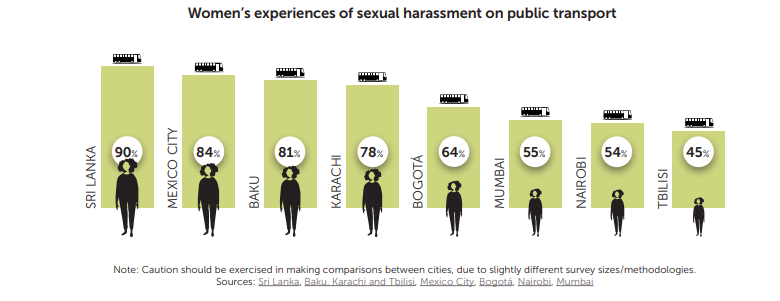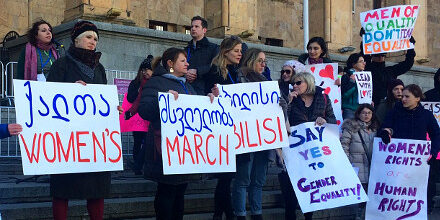Fidanka Bacheva-McGrath, CEE Bankwatch, August 2020
Knowledge is power. Informing women and men about the opportunities and risks of development projects should be the first step to empowering them to protect their rights. However, getting gender impact information from the European Bank for Reconstruction and Development (EBRD) has proven a challenge.
The EBRD prides itself on being the entity with the largest share of approved funding from the Green Climate Fund (GCF), with a total of USD 831 million – nearly 15 per cent of the GCF’s total portfolio. One of the EBRD’s flagship climate investment initiatives, the Green Cities Framework, secured support from the GCF in October 2018. The Framework prioritises sustainable, green investment, improving the resilience of vital urban infrastructure in countries from Tunisia to Mongolia. By May 2020, the GCF had made two disbursements under this framework, totaling USD 17 613 636. It appears that no Annual Performance Report has been produced yet for 2019, however.
According to the EBRD and GCF’s Gender Action Plan for the Green Cities Framework, the EBRD has committed to conduct Gender Impact Assessments on the country, sectoral (for the municipal environmental infrastructure sector), and project levels.
Since January 2020, Bankwatch has been requesting the disclosure of EBRD Gender Impact Assessments. Bankwatch member groups in EBRD Green Cities like Tbilisi and Skopje have closely followed the developments of the Green City Action Plans (GCAPs) and projects financed under the Framework, also requesting gender impact information.
After six months of repeated requests, calls and appeals, the EBRD has not disclosed a single Gender Impact Assessment. Well, with an estimated lifespan of 23 years of the GCF-funded Green Cities Framework, the EBRD has still another 21 years to get its act together. We are not holding our breath though, as many of our cities are already very advanced in the preparation of GCAPs and are starting transformative climate investment projects – without adequate assessment of gender risks and clear plans for mitigation and prevention of gender-based violence.
Tbilisi case study
The Tbilisi Metro project is the first operation expected to be co-financed by the EBRD and GCF under the Green Cities Framework. A sovereign loan of up to EUR 75 million to Georgia will be on-lent to the city of Tbilisi for the benefit of the Tbilisi Transport Company (TTC), which operates buses, the metro system and cable cars in Tbilisi. The GCF states that the project is kicking off an initiative to support low-carbon, climate-resilient urban development in the city. The project follows a number of previous EBRD investments in the public transportation system of Tbilisi and the development of the Tbilisi Green Cities Action Plan.
Green Alternative, Bankwatch’s member group in Georgia, analysed the EBRD supported GCAP for Tbilisi and the subsequent Green Cities Framework projects, hoping to shed light onto how gender has been addressed. On the positive side, the EBRD has made efforts to establish equal employment opportunities for men and women. As a proof of that, the Non-Technical Summary of the Tbilisi Metro Project and Tbilisi Bus Extension states that TTC has developed an Equal Opportunity Strategy. The Bank has helped TTC to set up training courses specifically for women drivers. Twenty-five women have already participated in the program, some of whom are already working as drivers.

However, a major concern raised in the briefing is the lack of opportunities for public participation, including for women, in the research and design of new modes and routes for public transport. This problem and wider concerns about governance standards in Green Cities planning and project investment were highlighted by a Bankwatch briefing on the EIB and EBRD’s investments in the Balkans and EU Neighbourhood, published in June.
Another matter of concern is that the projects, as well as city planners, have not been addressing the unique risks for women using public transport, such as the need to safeguard women against the sexual assaults that occur there. The Asian Development Bank (ADB), another important investor in Tbilisi’s transport system, raised the issue of gender based violence risks in its 2015 study. It reported that up to 45 per cent of interviewed women said that they had experienced sexual harassment or felt harassed or uncomfortable on public transport in the previous six months. In addition, 62 per cent of respondents considered sexual harassment in public transport and its environs a matter of concern.
Although a new bill was introduced in 2019 to make sexual harassment a punishable offence, numerous supplementary activities still need to be implemented by city planners and international financial institutions. While the Tbilisi Metro and Bus Extension Non-Technical Summary mentions TTC’s Equal Opportunity Strategy, there is no suggestion that an assessment of risks for gender based violence was done by the EBRD, its client or consultants.
In addition to its findings on gender, Green Alternative’s analysis raises the issue of the vast number of initiatives and parallel planning processes ongoing in the city. It notes that ‘the GCAP has both failed to launch an integrated approach to urban development in Tbilisi and to become integrated into the city’s urban planning more broadly.’ As a result, it appears that the Tbilisi GCAP has turned into an urban mobility improvement plan, rather than the comprehensive plan for Tbilisi’s integrated future green development.
The EBRD’s Gender Strategy needs to catch up with the GCF’s
One promising development has been the newly updated EBRD methodology for the development of the Green Cities Action Plans. The updated methodology places greater focus on governance and on gender mainstreaming. Moreover, EBRD-commissioned consultant teams hired to help cities develop Green City Action Plans need to have gender specialists. New Terms of Reference for consultants’ assignments reflects the need to analyse gender opportunities and risks, and to plan public consultations that provide space for women, gender organisations and vulnerable groups.
The EBRD, together with its sister institution, the International Finance Corporation (IFC) of the World Bank, recently published a good practice guide on Addressing Gender Based Violence and Harassment for the private sector. Although many of the EBRD’s clients and partners in the Green Cities initiative are public institutions, local municipalities and public services companies, there are a lot of tips in this guide that are relevant for our Green Cities. The guide includes a special focus on public transport, which is also relevant.
The question is, when can we expect to see all these good practices and effective prevention of gender based violence in our cities? When will the EBRD include gender risk assessment in its analysis for Green Cities plans and projects?
The Bank has focused its Gender Strategy on economic inclusion and has successfully demonstrated in the last decade that gender equality works. However, so far the Bank has shied away from committing to integrate gender protection alongside this promotion. It has artificially separated safeguards from its Gender Strategy, so unsurprisingly, there is a lot less to show for the effective implementation of its gender safeguards than for its economic inclusion work.
The EBRD’s Gender Strategy is at odds with the much superior and more comprehensive gender policy framework of the GCF. The GCF’s Original Gender Policy and Action Plan adopted in 2015 created a policy framework for assessing and addressing ‘risks for women and men associated with adaptation and mitigation activities financed by the Fund’. The Updated Gender Policy and Action Plan adopted in 2019 similarly seeks to promote climate investments that minimise social and gender-related risks. Gender assessments at the project level are required by both the 2015 and 2019 GCF policies.
The EBRD is well capable of implementing GCF standards, although the evidence that they have done so is still to be seen. Furthermore, the EBRD is well capable of developing its own robust policy framework. The Bank prides itself on having some of the highest safeguards policies among MDBs. The 2019 Environmental and Social Policy is a testament to the Bank’s commitment to sustainability and the protection of human rights.
Effective implementation of gender safeguards needs a strong commitment streamlined across a comprehensive policy framework. The new EBRD Gender Strategy, expected to be approved by the end of this year, needs to dovetail with the EBRD’s existing safeguards and to be harmonised with the policies of partner financiers like the GCF.
If the Strategy is to be effective, it must guarantee the right for all to be informed about its operations, and it must require the inclusion of the very people most at risk in decision-making, regardless of gender. With the support of the GCF, the EBRD can already begin to implement these as part of its Green Cities plans and projects.
Post submitted by Rosa Hergan, CEE Bankwatch



Recent Comments